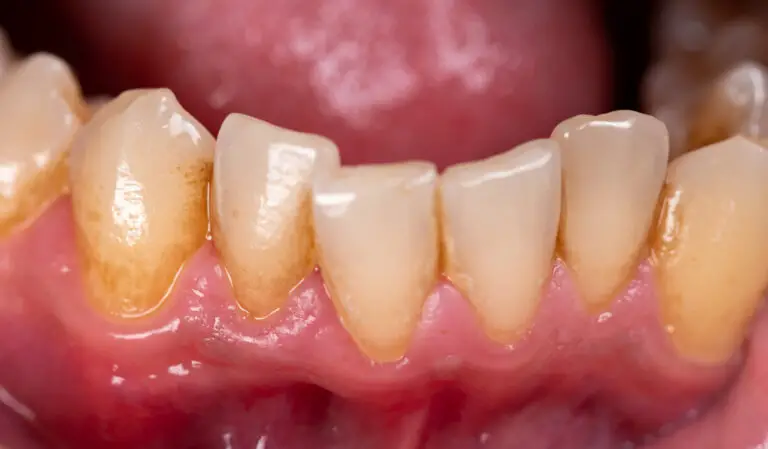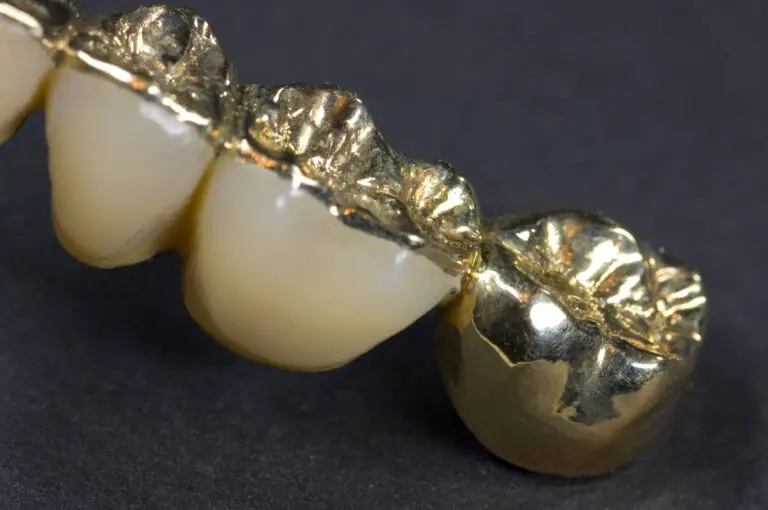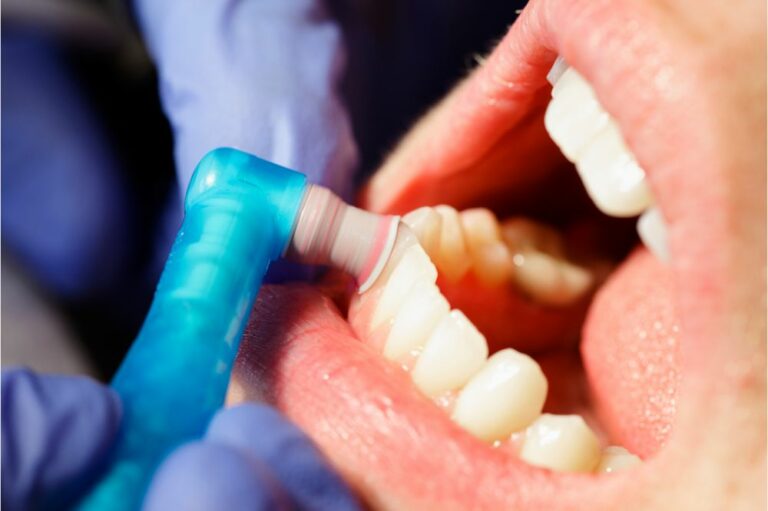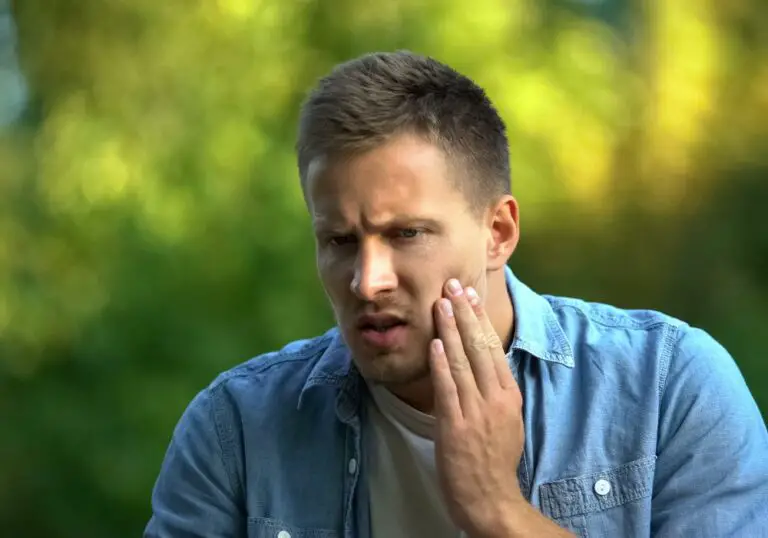Losing one or more teeth is an unfortunate but common occurrence for many adults. Missing teeth can greatly diminish our quality of life by affecting our speech, eating ability, nutrition, and appearance. While dental implants offer a permanent teeth replacement solution, they tend to be very expensive and require surgery. A more affordable option for many people is getting removable false teeth known as dentures or partial dentures. However, as dentures from a licensed dentist can also cost thousands of dollars, some individuals wonder if it’s possible to fabricate their own false teeth at home through do-it-yourself methods. In this comprehensive article, we’ll delve into the world of homemade dentures – analyzing the feasibility, materials required, steps involved, costs, longevity, and potential problems.
What are dentures and how do they replace natural teeth?
Dentures are removable appliances that replace missing teeth and surrounding gum tissues in the upper or lower jaws. Conventional dentures are made of an acrylic base holding one or more artificial teeth made from plastic, porcelain, or composite resin.
Complete dentures fit over the gums and replace all teeth in a jaw after extractions. They rely on the underlying gums and bone structure for support. Complete dentures can be either of two main types:
- Immediate dentures – inserted immediately after removing remaining teeth.
- Conventional dentures – inserted after gums heal, around 8-12 weeks after extractions.
Partial dentures fit over the gums and replace one or more missing teeth while being supported by the remaining natural teeth. Precision attachments like clasps hold the partial denture in place.
Dentures improve not just chewing ability but also speech, facial aesthetics, and support for facial muscles. Well-fitted dentures prevent surrounding teeth from tilting or over-erupting into empty spaces. However, dentures are not as comfortable or efficient as one’s natural teeth and need diligent oral hygiene and daily cleaning.
Is it really possible to make DIY dentures at home?
In theory, it is technically possible for a motivated person to craft their own dentures at home. Unlike a single crown or bridge which requires advanced equipment and skills, basic dentures could be fabricated at home with considerable effort and patience.
However, creating well-fitting, natural looking dentures requires expertise in dental materials, anatomy, laboratory procedures, and handling tissues and acrylics. While DIY denture videos may make it look easy, meticulous precision is needed at every step to create an appliance that is comfortable, functional, and long-lasting. Poor quality or ill-fitting dentures can lead to tissue damage, chewing difficulty, and other oral health issues.
For best results, working closely with an experienced dentist is strongly recommended when getting dentures made. Nonetheless, with enough research and practice, some people may be able to make passable temporary dentures on their own by following dental laboratory processes. We shall explore the various intricacies involved.
What are the advantages and disadvantages of homemade DIY dentures?
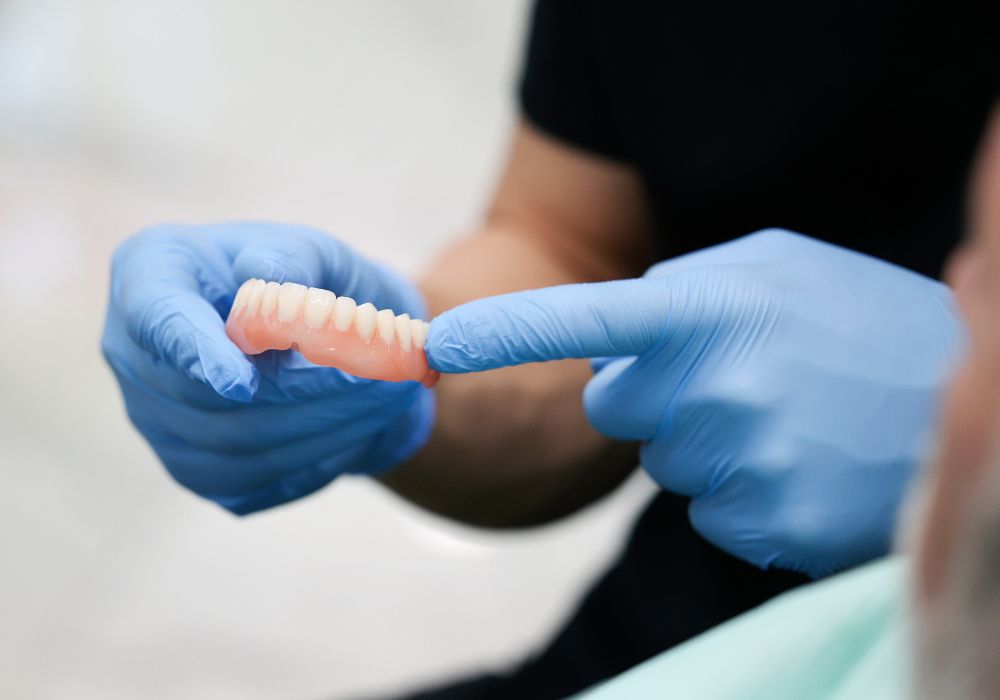
Potential advantages of homemade dentures:
- Much lower cost – Avoid dentist fees and lab charges
- Customization – Can adjust and rework it until satisfied
- Convenience – No need to visit a dentist multiple times
- Privacy – Some people prefer avoiding a clinic
- Educational – Learn about dental materials and processes
Potential disadvantages of homemade dentures:
- Inferior fit – Achieving proper retention is difficult without training
- Weaker materials – Durability is lower than professional dentures
- Imprecise shaping – Can cause gum irritation and speech issues
- Poor aesthetics – Matching natural teeth color and shape is hard
- Limited solutions – Still need a dentist’s help with extractions and measurements
- No expert guidance – Trial and error process, high risk of redoing steps
- Skills required – Proficiency needed in dental lab work and materials
As we can see, while DIY dentures may seem like an affordable and accessible option, they require great skill to create and the end results may still be unsatisfactory. Getting dentures made professionally is still the recommended approach.
Step-by-step process for making dentures at home
Constructing homemade dentures involves multiple phases requiring careful execution. Here is an overview of the key steps:
1. Make preliminary impressions
The first step is taking accurate impressions of the upper and lower gums using dental alginate powder and water. This gives a mold of the ridge shape. Avoid air bubbles while mixing and setting the putty-like material.
2. Pour plaster models
Pour dental plaster stone into the alginate impressions to create positive casts of the upper and lower gums. Let this fully set into hard models.
3. Select and setup artificial teeth
Based on shade guides, choose plastic or porcelain teeth that match your natural teeth color. Arrange the artificial teeth in wax over the plaster models, mimicking your original bite position.
4. Try-in the waxed denture
Do a trial insertion of the wax-setup denture in your mouth to check comfort, shape, size, retention, and bite alignment. Make any needed adjustments.
5. Flask the waxed denture
Embed the wax trial denture between two halves of a denture flask filled with plaster. The flask creates the final mold space.
6. Eliminate all wax
Boil out or chemically remove all wax from the flasked denture, leaving behind empty space for the final acrylic base.
7. Process and cure the acrylic resin
Mix special denture acrylic powder and liquid monomers. Pack this into the flask to occupies the space left by wax. Allow thorough curing and polymerization.
8. Trim excess and polish
Once cured, remove denture from the flask and use a handpiece or burrs to trim away excess acrylic. Smooth and polish all surfaces.
9. Try in denture and make adjustments
Insert finished denture and carefully adjust areas causing discomfort. This helps achieve a secure, comfortable fit.
As seen, fabricating a denture requires proficiency in dental materials and technique as well as artistic skills for arranging teeth. Rushing the process could lead to ill-fitting results.
What materials and equipment are essential for making homemade dentures?
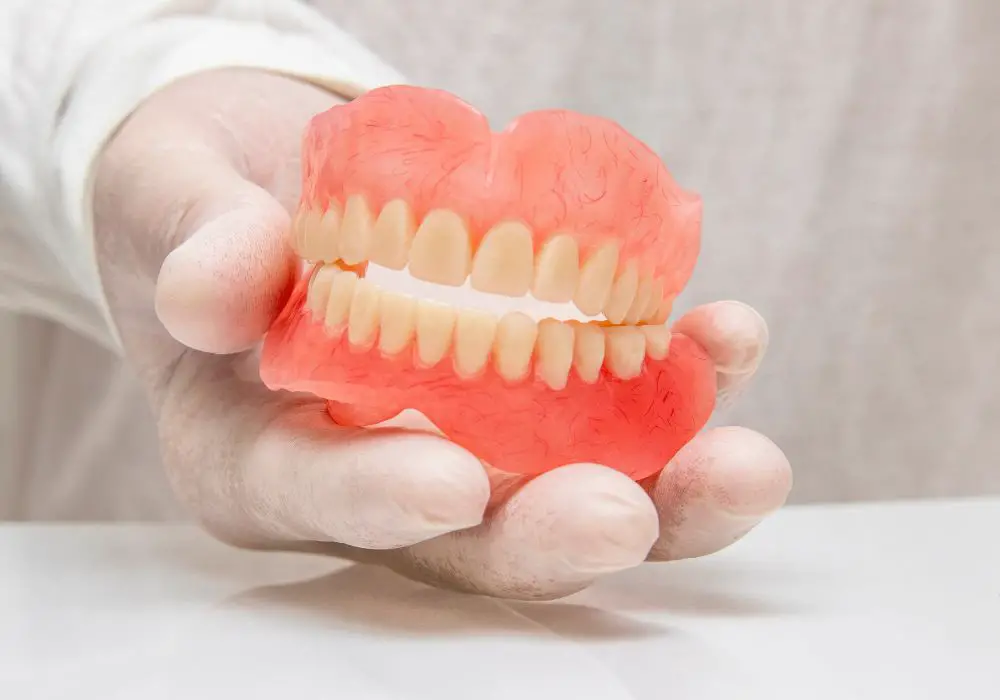
Some key materials and equipment needed include:
Materials:
- Denture base resin (heat-cured or self-cured acrylic)
- Artificial plastic or ceramic teeth
- Dental plaster and dental stone
- Dental wax for modeling and trial dentures
- Flasks for processing the denture
- Dental alginate for impressions
- Dental monomer liquid and initiator powder
- Teeth bonding resin and plasticizers
- Petrolatum or tin foil substitute for wax elimination
Equipment:
- Dental handpiece or acrylic burrs for trimming
- Model trimmer for refining the plaster casts
- Wax spatula, carver, and hot plate for wax sculpting
- Mixing bowls, scale, and spatula for acrylic
- Boiling or curing unit for denture polymerization
- Face mask, gloves, eye protection – for safety
- Dental pumice and polishing kit – for smoothness
- Storage containers for soaking and cleaning
Acquiring all these specific supplies can be challenging and expensive. Careful shopping around dental suppliers is necessary to find affordable options suitable for home use.
What skills and training are needed to make passable homemade dentures?
While anyone can attempt creating their own dentures with the right materials, producing a well-fitting, durable set requires certain skills acquired through training or experience:
- Familiarity with dental materials – Knowing how to correctly use impression materials, waxes, acrylics, plaster, teeth sets etc.
- Manual dexterity – Ability to precisely position and fix artificial teeth into wax bases. A steady hand helps tremendously.
- Artistic sense – A keen eye for color matching, symmetry, and replicating natural tooth arrangement.
- Attention to detail – Meticulously following each step and carefully noting issues causing discomfort.
- Patience – Willingness to remake impressions, redo wax rims, or restart curing if not satisfied with trial dentures. A perfectionist approach is helpful.
- Understanding of oral anatomy – Knowing gum curvatures, jaw relations, and muscle attachments allows proper sculpting of denture borders.
- Basic denture repair skills – Ability to troubleshoot issues and make small adjustments when denture breaks or needs realigning.
Gaining proficiency in these areas before attempting denture fabrication greatly improves outcomes. Having an experienced dental technician’s guidance can make the learning curve easier.
What pitfalls should be avoided when making DIY dentures at home?
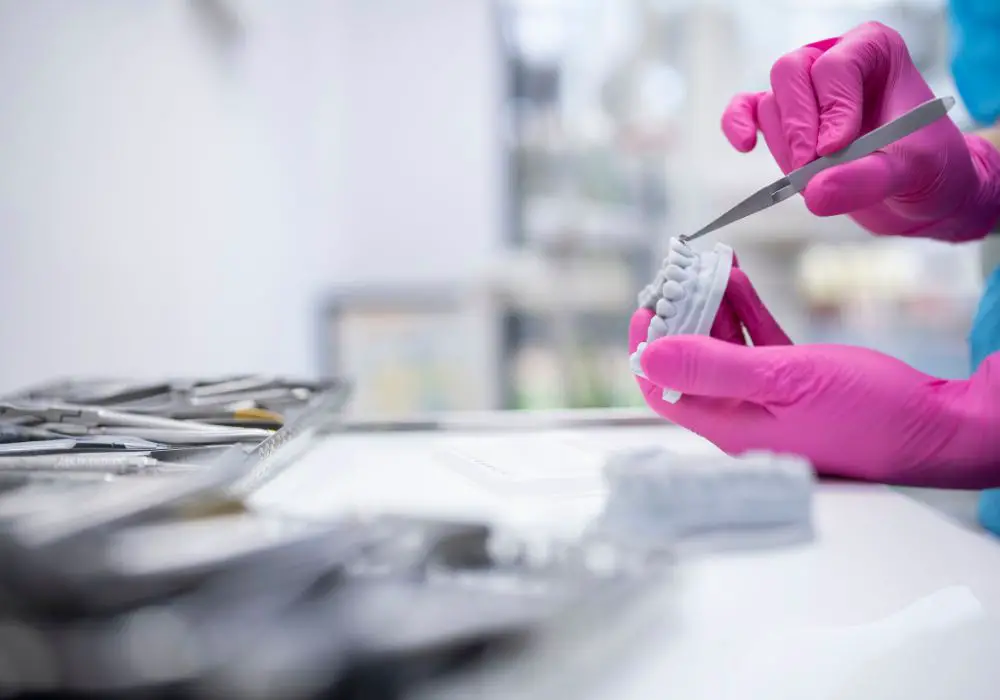
As creating dentures involves many intricate steps, beginners should be vigilant of these potential pitfalls:
- Taking rushed or inaccurate impressions of the gums. Any distortion ruins the model.
- Choosing low quality or incompatible dental materials that break or have poor adhesion.
- Inadequately waxing and arranging the teeth leading to poor occlusion.
- Failing to completely eliminate wax residue before packing acrylic. This prevents curing.
- Allowing air bubbles to form in the liquid acrylic mix before packing into the flask.
- Not applying enough pressure when clamping the denture flasks. Results in material leakage.
- Curing at incorrect temperature or for insufficient time leads to weakened acrylic base.
- Trimming too aggressively and damaging the fragile denture base or artificial teeth.
- Skipping trial insertion and occlusal adjustment steps before finalizing the denture.
- Attempting overly complex designs beyond one’s current skill level.
Avoiding such missteps requires studying visual guides, following checklists, and learning from an experienced dental lab technician if possible. Rushing the process usually leads to frustration and failed results.
What maintenance is required for homemade dentures?
Like professional dentures, homemade ones also demand diligent daily and weekly care:
Daily:
- Gently brush dentures morning and night using a soft brush and mild soap. Avoid abrasive toothpaste.
- Rinse thoroughly under running water. Soak dentures in water when sleeping.
Weekly:
- Soak dentures for 20-30 minutes in denture cleaning solution to disinfect.
- Scrub tartar and stains using a denture brush and toothpaste.
- Rinse dentures thoroughly before wearing again.
Proper storage:
- Always store dentures in a filled denture bath when not being worn.
- Change the water daily to avoid bacterial growth.
Regular maintenance is crucial for denture hygiene, preventing oral infections like stomatitis under loose fitting dentures.
How long can we expect homemade dentures to last?
The longevity and durability of homemade dentures depends on:
- Materials used – Commercial acrylics and teeth last longer than homemade alternatives.
- Construction quality – Precise flasking and balanced bite improves durability.
- Good oral hygiene – Cleaning regularly prevents decay and staining.
- Care during use – Avoiding hard foods that can crack dentures.
- Periodic relining – Getting reline redone every 6-12 months.
With optimal care and maintenance, homemade dentures may survive 1-3 years before needing replacement. However, factors like inadequate monomer-polymer ratios, trapped air bubbles, and imperfect curing can weaken the acrylic base and teeth attachments – requiring earlier remaking.
In comparison, professionally made dentures use superior materials and precision construction to potentially last 5-7 years or longer. Getting repairs and timely relining also improves longevity of both homemade and professional dentures.
What are the typical costs of professionally made dentures vs DIY dentures?
Professional dentures costs:
- Complete dentures – $1000 to $3000 per arch
- Partial dentures – $500 to $1600 per arch
Homemade dentures costs:
- Materials and equipment – $200 to $500 one time cost
- Artificial teeth – $20 to $100 per tooth
- Denture base material – $50 to $100 per denture
- Total – $300 to $600 per denture
While professional denture costs are higher due to dentist fees, lab charges, superior materials, and precision techniques – they tend to have much better fit, function, and aesthetics compared to homemade ones. However, homemade dentures can be a more affordable short-term solution for some people.
Can dentures be made at home using a 3D printer?
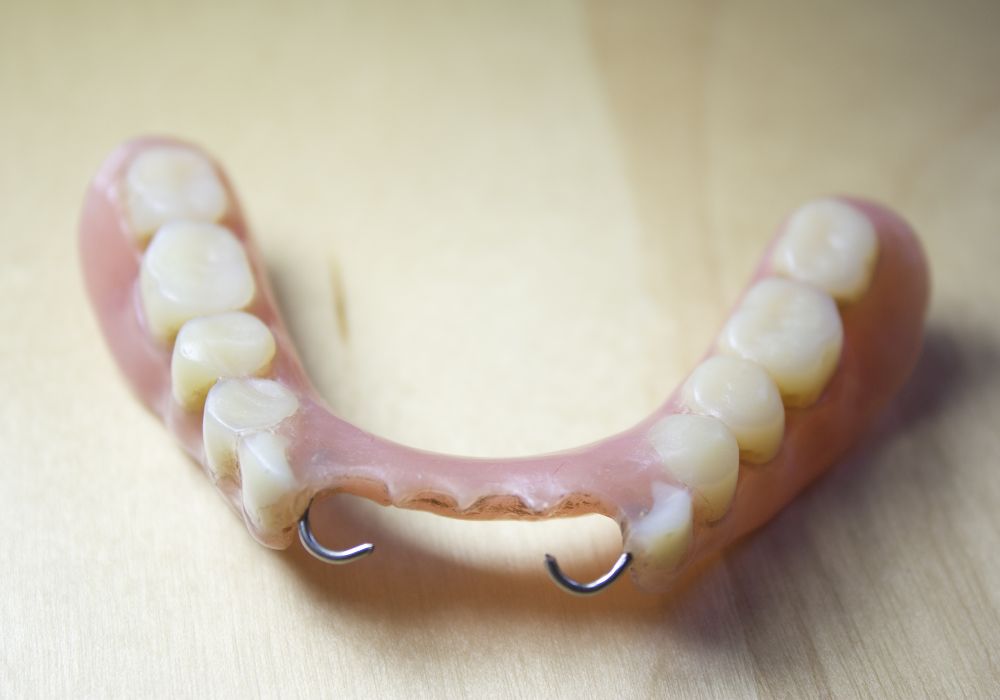
3D printing technology is growing in popularity for fabricating dental appliances. Some denture materials like biocompatible resins can be 3D printed into a denture base. However, a 3D printer alone cannot create finished, polished dentures ready for wear. Additional steps would still be required:
- Take dental impressions and create digitized scans.
- Design the model for the denture and select appropriate resin material.
- 3D print the raw denture base without teeth.
- Bond artificial teeth into the printed base manually.
- Try-in the denture for fit and make bite adjustments.
- Polish and trim the final denture.
So while 3D printing can aid in production, it does not eliminate the need for impressions, tooth settings, and careful finishing. Used in combination with traditional methods, it may help experienced dental technicians streamline certain fabrication steps. But for most DIY makers, manually making dentures still gives greater control over the process.
Are there any legal or regulatory issues with making homemade dentures?
In most countries, dentistry is a regulated professional practice and treating patients requires being a licensed dentist. However, currently, in the U.S., it is not illegal for an individual to make their own dentures, provided they are for personal use and not being sold commercially. The same regulations apply for someone making their own dentures as opposed to other forms of DIY healthcare. However, there are certain risks that should be considered:
- Lack of training can lead to ill-fitting dentures causing oral health issues.
- Infections are possible if unsterile materials or techniques are used.
- Serious dental problems may be overlooked by not consulting a dentist.
- Improper materials in the mouth can cause allergic reactions.
- Legal issues may arise if trying to sell or provide dentures to others.
So while law does not prohibit personal DIY denture creation, one should educate themselves adequately and accept liability for any potential complications. Getting a dentist’s input can help mitigate risks.
Conclusion
Making your own removable false teeth is an endeavor requiring substantial effort, care, and perseverance. While technically possible with the right materials and equipment, producing well-fitting, natural looking dentures that are comfortable and durable via a DIY approach can be very challenging without training in dental techniques. However, with enough research, planning, and practice, some individuals may be able to create passable short-term dentures on their own, at a fraction of the cost of professionally made ones. This allows those unable to afford standard treatments to still experience improvements in speech, confidence, and chewing ability. Nonetheless, consulting an experienced dentist is advisable for most people considering dentures. With realistic expectations and diligent maintenance habits, homemade dentures could provide an alternative for replacing missing teeth.
Frequently Asked Questions
Q1. Can I make a single tooth denture myself?
A1. Making a single tooth denture that precisely fits and functions well is extremely difficult for a beginner. Getting a partial denture made for a single missing tooth by consulting a dentist is more advisable.
Q2. What oral health problems can improperly made dentures cause?
A2. Ill-fitting dentures that have poor retention and stability or sharp edges can cause gum irritation, mouth sores, tissue laceration, speech issues, and difficulty chewing or biting. Poor occlusion from incorrect bite alignment may also worsen temporomandibular joint pain.
Q3. How do I properly care for my homemade dentures?
A3. Clean dentures daily by gently brushing using mild soap and water. Rinse thoroughly. Soak them in denture cleaning solution weekly. Always store dentures moistened in water when not being worn to prevent warping. Handle dentures carefully to avoid drops or cracks. See your dentist promptly if oral problems develop.
Q4. Is it advisable to eat and sleep with homemade dentures in the mouth?
A4. No, while professionally made dentures are designed for extended wear, homemade ones often lack precision retention so keeping them in 24/7 increases the risk of tissue damage. Remove homemade dentures for sleeping and select soft, easy to chew foods when eating. Consult your dentist regularly.
Q5. How can I improve the fit of loose homemade dentures?
A5. Start with gentle boil and bite adjustment of the base using hot water to mold it better to your gums. If still loose, try denture adhesives temporarily but seek professional relining for optimal realignment and renewed retention. Frequent adjustments may indicate the need for denture remaking.

